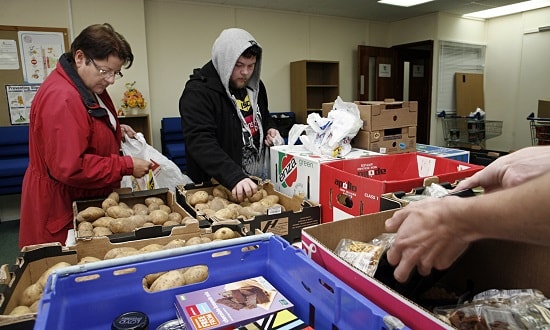
Six months after England’s National Food Strategy (NFS) was published, food insecurity in Britain is growing. The Strategy – the result of more than two years of government meetings with industry leaders and academics – was intended to provide a basis for the government to address food and hunger targets for the UK food system. In the six months since its publication, the Food Foundation found that food insecurity in Britain increased to affect nearly 11% of the population, including 2.5 million children. Alongside record levels of poverty and hunger go record profits. The Trussell Trust reports food bank use is up 123% in the last five years, yet the supermarket Sainsbury’s can gloat over profits predicted to be £720m in the last year. The UK’s food poverty rate is among the highest in Europe, despite Britain being the sixth richest country on the planet. This is the reality of production under capitalism.
The NFS report shows how the system is perpetually skewed against the poorest sections of society having access to adequate quantities of healthy and nutritious food. It first came to the attention of the press due to its recommendation for a £3bn sugar and salt tax to reduce the consumption of junk food. The tax would have imposed a £3 per kilo tax on sugar (£6 on salt) for wholesalers for use in the processed food industry. The report demonstrates how the poor currently rely on highly processed foods, as healthier food is too expensive and inaccessible. It tells us how there are an estimated 1.9 million people in the UK living without a cooker, 2.8 million people without a freezer, and 900,000 people without a fridge – poor people are condemned to eat worse food because they do not have access to the right equipment. Recently, food banks reported claimants turning down potatoes and root vegetables because they had no means of cooking them. Of the manufactured food products sold in the UK, 85% are deemed to be so unhealthy they are unsuitable for marketing to children. The confectionary market (£4.2bn) dwarfs the home-grown fruit and veg market (£2.2bn). The UK food industry is tied up in making the working-class become sicker and die younger. People in the most deprived decile are almost twice as likely to die from all preventable causes, compared to those in the richest decile. Women in the most deprived 10% of neighbourhoods in England now die 3.6 months younger than they did in 2010. Their life expectancy is 7.7 years less than that of women in the richest areas.
When Tim Rycroft, a spokesman for the Food and Drink Federation, was asked for a BBC documentary whether the priority of UK food companies should be profit or public health, he answered without hesitation: ‘Profit’. The money raised from a sugar and salt tax would have been used to expand free school meals. However, the government barely reacted to the 150-page report; nor did it commit to limiting the profits of food companies, instead focusing on ‘levelling up’ and ‘rewarding exercise’, shifting the blame onto working class people.
The report largely focuses on the destruction of the environment caused by the world food production system. This system – which it calls ‘both a miracle and a disaster’ – is the single biggest contributor to biodiversity loss, deforestation, drought, freshwater pollution and the collapse of aquatic wildlife. Fishing and bottom trawling have caused marine biodiversity to fall by 49% between 1970 and 2012. While 300,000 species of plant have edible parts, just 20 species account for 90% of the world’s food. There has been a 338% increase in children’s A&E admissions caused by food allergies – it is thought environment, genetics and the gut microbiome all play a part. The UK government proposals to reduce carbon production to 78% of 1990 levels by 2035 are deceptive – the plan completely ignores carbon generated by goods produced abroad by UK firms or imported into the country for consumption.
Under capitalism, profits come first, there is no rational organisation of land use or production for human needs. In Britain, ‘golf courses occupy five times as much of our land as orchards’. The report states that ‘about 70% of the landmass of the UK is devoted to agriculture, with feed and pastures for beef and lamb taking up the vast majority of that land.’ Yet British capitalism uses the same amount of land again, but obtained overseas, to satisfy its need for profits – the combined land area for rearing beef and lamb for UK sale (24 and 38 million hectares) is actually larger than the UK itself. Yet this extravagance offers little nutritional benefit to the population, ‘85% of the farmland that feeds the UK, both here and abroad, is used to rear animals – even though meat, dairy and eggs only provide 32% of the calories we eat’. The capitalist market cannot deliver what is required.
In order to achieve net-zero carbon emissions by 2050, Britain’s Climate Change Committee estimates that just over 20% of agricultural land must be rewilded (or converted to bioenergy or non-agricultural crops) and peatlands must be restored to capture carbon. This task will be impossible for the capitalist state to achieve without deeper exploitation and land grabs abroad to compensate the loss of profitable land use. British carbon emissions may go down, but they will be forced up for the world as a whole.
Capitalism means chaos both for the environment and food production. Only a socialist society that puts the needs of humanity before the profits of multinationals and implements a planned economy can ensure the rational use of land, the protection of the environment and healthy, affordable and accessible food for all.
Anthony Rupert
Fight Racism! Fight Imperialism! No 287, April/May 2022




